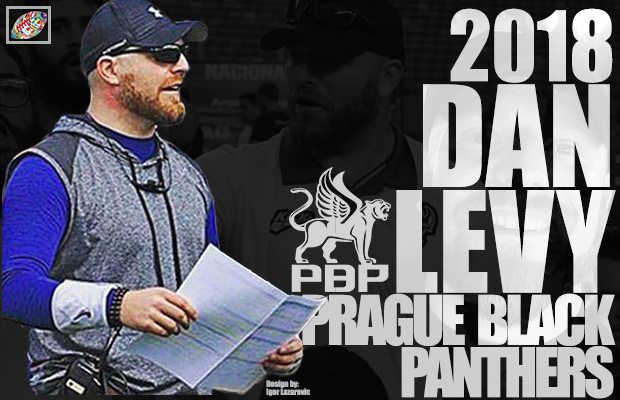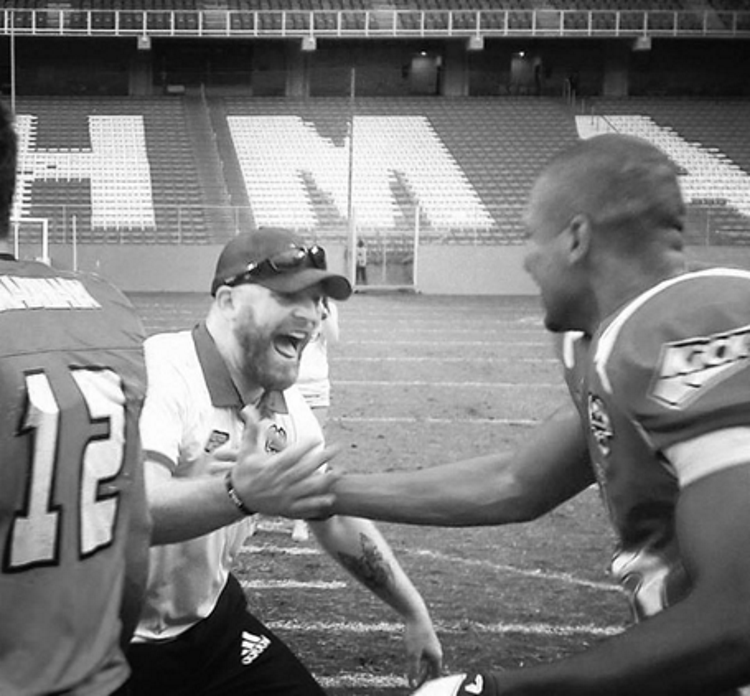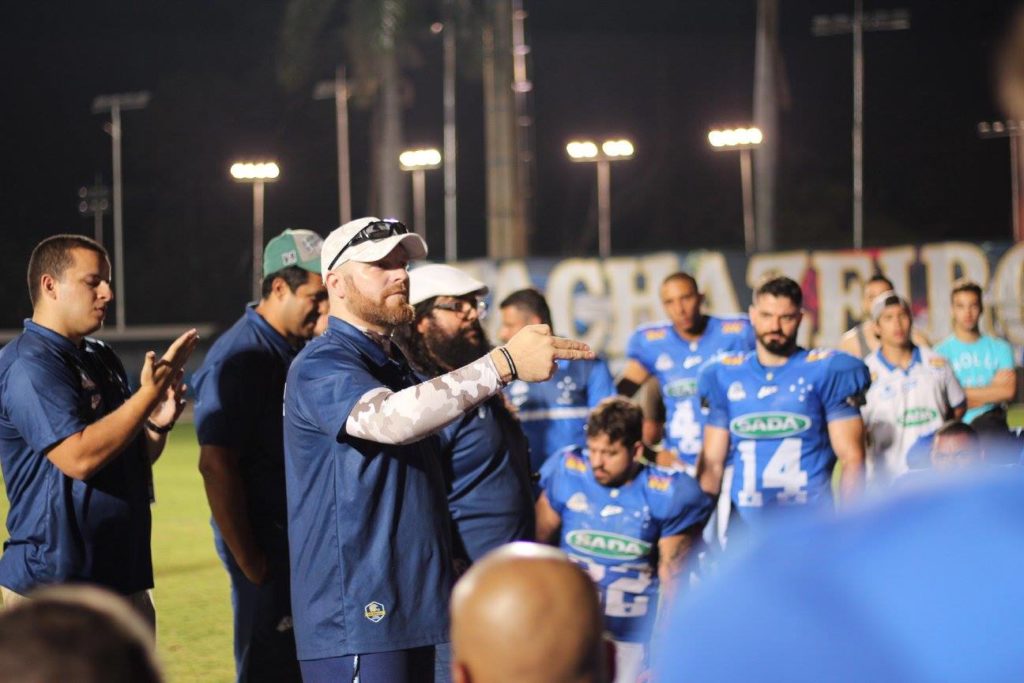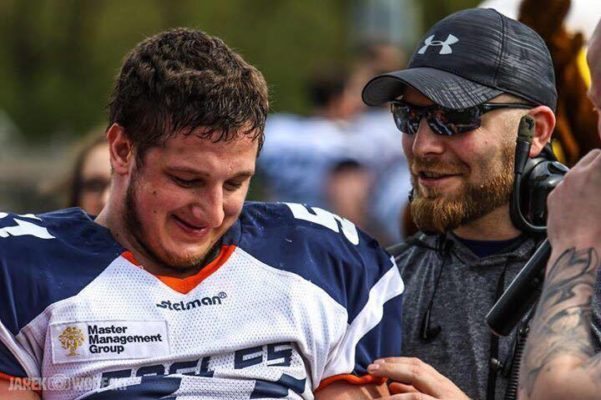Championship-winning HC Daniel Levy headed to Prague Black Panthers in Czech Republic

Coming off a brilliant first year national championship in Brazil, guiding the Belo Horizonte Sada Cruzeiro to a Brazil Bowl victory in their first year in existence, Daniel Levy is returning to Europe and the Prague Black Panthers in the Czech Republic.
The 33 year old Levy will take over a Black Panthers team that won its fifth straight Czech title in 2017.
American Football International asked him about his football coaching journey and plans for the future.
American Football International: You are entering your eighth season of coaching football overseas. Take us through your journey so far.
Daniel Levy: Well I got involved with football overseas after college with the Limerick Vikings in Ireland. I played overseas from 2005-2008. I tried getting a real job in 2008 and worked as a defense contractor until 2010, so I was out of football but ultimately missed it too much. I came back and started coaching high school in Louisiana and that was when I was hired as the Head Coach of the Kristiansand Gladiators in Norway. In 2011 they were playing in Norway’s second division and we were promoted to the top division in 2012. I came back and we kind of scratched and clawed our way all the way to the final where we lost to the Oslo Vikings.
After that I came down to Brazil with the LFA, but when it folded I was hired by the Vila Velha Tritoes. I coached there in 2014 and that’s when I met Alvaro Fadini, who would eventually be my Sada Cruzeiro QB. We made the playoffs that year, but I left to go coach the Ancona Dolphins in Italy. I took them to the playoffs in 2015 after a small drought, and it looked like it could be a long-term situation, but I was offered the Offensive Coordinator job with Alfred State College and decided to take it.
Alfred State proved to be another one-season endeavor as I received a very good offer from the Warsaw Eagles [Poland] and was able to bring some staff over with me. Lex Braga--a Brazilian who was my defensive coordinator this year with Cruzeiro–was among those coaches. Things did not work out there, and that’s what kind of led me back to Brazil. The BH Eagles–who would eventually become Sada Cruzeiro–had hired my QB from Vila Velha, Alvaro Fadini, and after speaking with him and some other people, I decided to take the Head Coach job with them for 2016. The rest is history.
AFI: You have just won the Brazilian championship with a first year team. Was this your first national title?
Levy: Well if you count last season, this is actually my second national title as a Head Coach since we won the Liga Nacional (2nd Division) with the BH Eagles in 2016. I definitely count that title because in a lot of ways it was harder. That was truly the team’s first season of national competition. The roster was made up mostly of rookies, and that included my coaching staff. It was an incredible workload for me, and in a lot of ways was like my early jobs in Europe and Brazil where I kind of had to coach all positions and all phases of the game.
So while this year was definitely a higher competition level, and after winning it we can truly claim the title of the best team in Brazil and in South America–last year’s Liga Nacional title meant a lot in its own right.
AFI: How much longer do you think you want to coach abroad?
Levy: This is my career. After leaving international football and coming back, then dabbling in college football, and really running the gambit in terms of options, I can safely say that I consider myself an international football coach. Part of my decision-making process in leaving a great football team in Sada Cruzeiro–a team which I feel I really built from the ground up–was the question of “where do I want my life to be?” Prague is a city that I really fell in love with years ago, and if all goes well, I hope to call PBP my home for the foreseeable future.
AFI: You have coached college teams. What are the major differences between coaching college and club teams?
Levy: There’s a few differences, probably the most obvious one being infrastructure and support. When you’re coaching college football, you have a lot of things that are YOURS. You have YOUR offices, YOUR field, YOUR meeting rooms. You have YOUR coaching staff who are all professional. When you’re coaching overseas, with 90% of teams you’re renting fields, you have kind of makeshift office and meetings space, you have coaches who have day jobs and are usually volunteering or part-time. That is a huge difference, and you have to be creative in finding ways to make it work, or to at least in how you optimize what you have.
Another difference is probably the baseline football IQ. There’s some very football savvy players overseas, but they tend to be the exception. The gap between your high-football IQ players and low-football IQ players is much, much, MUCH wider than it is in college football. As a coach, you have to be cognizant of that. A lot of times players think they understand a concept or a fundamental when they don’t… or else they are too nervous to tell you. And then all the sudden you are 4 months into your regular season and realizing that your DE doesn’t understand wrong-arming, or that your CB does not know the difference between cover 2 and cover 3. Generally, your baseline in college football is a little higher, so it’s easy to forget to be vigilant about this when you’re coaching overseas.
AFI: How much do you think football has developed since you started coaching abroad?
Levy: The development has been incredible, and it’s really been boosted in recent years by the presence of social media. When I was playing, it was kind of still the primitive days of Facebook. But if you look at Brazil, for example–a country where people are very active on social media–the sport has truly become viral. All of the sudden it is much easier to share news, post highlights, to facilitate contact between players, teams, and coaches. I really think we are entering a new era of international football where the game’s growth and development is becoming a force of nature, especially in countries such as Brazil. And the level of play worldwide is just higher since players now have much easier access to information via Facebook or Youtube, and coaches have more opportunities to gain experience abroad through similar channels.
Not to mention the avenues this has opened up for teams in terms of media, marketing and sponsorship. So the development and growth of American football overseas really has been fun to watch over the last 7-10 years.
AFI: You have taken over a championship team in Prague. Does that present a different kind of challenge?
Levy: In many ways, yes. I think a lot of people would ask “What’s left for this team to accomplish?” since they are perennial national champions. But my approach will be the same as it is everywhere. I’m not going to Prague to make the Black Panthers the best team in the Czech Republic. I am going there to make them the best team they are capable of being. We will be competing in the CEFL in 2018, and our first game will be against the Swarco Raiders, who are consistently one of the best programs in Europe. I spent some time at Swarco’s training camp last year and talking with their HC, Shuan Fatah, and that is a program we definitely need to emulate. But for now, my immediate goal upon arrival is to figure out a way to steal a win from the Swarco Raiders.
So this is definitely a different challenge for me when compared to building a team from scratch. But the goal is ultimately the same–to make the team, the players, and the program the best they are capable of being.
AFI: What do you think you bring to the Black Panthers?
Levy: The first thing I bring to the team is vision–the vision to take this from being a football team to a football program. I brought that vision to Cruzeiro, and I feel like I have the foresight to see not just a season down the line, but to see where I want the program to be 3 years and 5 years from now, and the understanding of what we need to do as an organization to get us there. I understand that realities of international football, and I have plenty of experience operating within those realities.
I also bring a youth and energy that should help me to motivate both new and veteran players. I know that PBP has had some good head coaches come through there over the last few years, but I am still in my early 30s, and I think that that youth helps me connect with my players and also makes me a little bit more of a risk-taker. I look at our CEFL schedule–where most would say we really drew the short end of the stick–with early games against the Swarco Raiders and the Wroclaw Panthers. Both of them are dominant teams, national champions with great facilities and tremendous resources, and outstanding coaching staffs that have been there for years. They are true football programs, whereas PBP is a team in transition with another first-year head coach.
Practically speaking, the odds are heavily against us beating either one of those teams. But maybe I am just too young in my career to give a shit. I am 100% focused on figuring out a way to beat both of them. I want to beat two of the best teams in Europe, and I want to win the CEFL. And if that doesn’t happen, I will be disappointed–regardless of how probable or improbable the odds may be.
Added thoughts…
I would just like to thank the Sada Cruzeiro fans and all of my players and coaches for two amazing, unforgettable seasons! From the moment I landed in Belo Horizonte, you embraced me as part of your family and as your leader, on and off the field. You were bought in from day one, and all of our success these last two seasons doesn’t happen without you. I am humbled and honored to have been your coach. Glory is the memories that you never forget, and I can honestly say that my two seasons with Sada Cruzeiro have been the most glorious of my career.
While it will be bittersweet to leave my current home and start over at my new one, I could not be more excited to be coaching the Prague Black Panthers. They are a team I have followed for years and almost became the Head Coach of last season, but my heart was not ready to leave Cruzeiro. I am excited for the new challenge and to embrace the new brotherhood waiting for me at PBP.
So to both of my teams, old and new: Thank you for the confidence and for the opportunity. And thank you to AFI, as always, for the great work you are doing.


